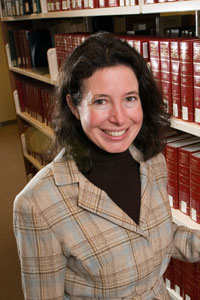  |
| HOME | THIS ISSUE | CALENDAR | GRANTS | BACK ISSUES | < BACK | NEXT > |
Law professor assists Iraq tribunalby Michael Kirk - May 30, 2006 |
||||
|
Those trying the former dictator of Iraq are receiving expert counsel from Connecticut.
UConn law professor Laura Dickinson is one of three law school faculty members in the United States who are providing assistance to the tribunal trying the former ruler of Iraq, Saddam Hussein. Dickinson and the other members of the consortium work with the U.S. Department of Justice Regime Crimes Office in Iraq. She says she believes strongly in the mission of the Hussein tribunal. “I think it’s very important for trials to take place,” she says, “because accountability and reconciliation for the widespread human rights abuses that occurred during the Hussein regime are essential for Iraq to make a transition to democracy.” The path to justice in the trials can be a difficult one, however. “For the trials to promote accountability and reconciliation in Iraq, it’s important for Iraqis to feel that they have some ownership of the process,” Dickinson says. “The difficulty is that because it is a solely Iraqi-run court and because most of the judges are Shiite or Kurdish, the trial may not be seen as legitimate by all Iraqis, in particular the Sunnis. As a result, that could undermine the perceived legitimacy of the process.” She believes the court should invite judges from other countries to serve alongside the Iraqi judges, but says the Iraqis are not willing to do so. Dickinson teaches classes in international human rights at the School of Law, including one focusing on the trial of Husssein and others accused of having committed atrocities in Iraq. “As professors, we advise students who write research memos on legal issues in war crimes law that are likely to be relevant to the trial of Saddam Hussein and the others who are being tried before the court for atrocities they are accused of having committed in Iraq,” says Dickinson. On May 23, Dickinson delivered remarks at the National Press Club in Washington, D.C., when Amnesty International released its annual report on human rights across the world. She discussed the deficiencies in the current contracting system in Iraq, including the lack of human rights training for employees and the problems associated with the system. Dickinson previously served as a law clerk to U.S. Supreme Court Justices Harry A. Blackmun and Stephen G. Breyer, and later as senior policy advisor to Harold Hongju Koh, assistant secretary of state for democracy, human rights and labor under President Clinton. She initially became interested in the field while still in school. “I took a human rights clinical course in law school,” she says, “and the next thing I knew I was in the Caribbean with a group of students and lawyers interviewing Haitian migrant workers who were being rounded up and deported – without consideration of their likely status as refugees. They were being deported back to Haiti during the brutal Cedres regime.” Dickinson worked on a petition on behalf of the migrant workers to the Inter-American Commission for Human Rights, and also participated in several other cases. “I feel as if I had a mini-career as a human rights lawyer while I was a law student” she says. “And it made me realize how much good the law can do.” |
| ADVANCE HOME UCONN HOME |

